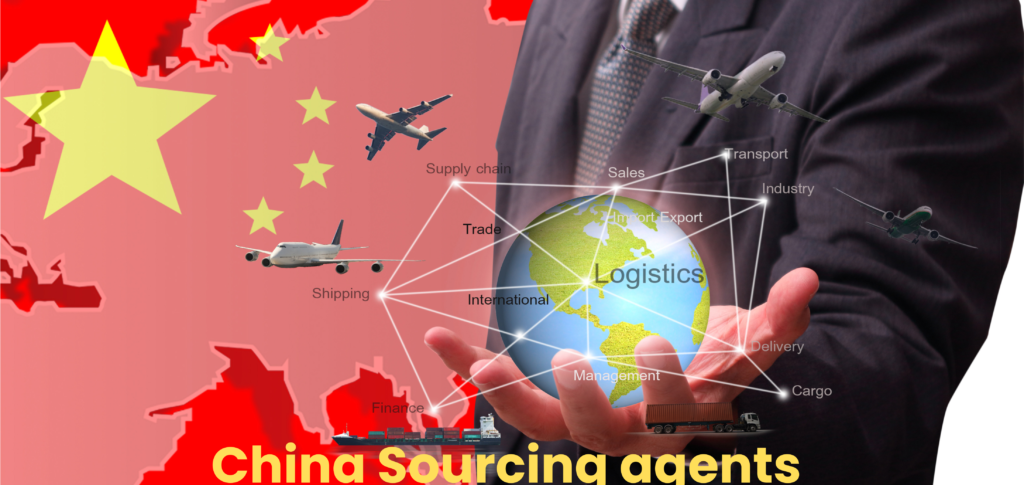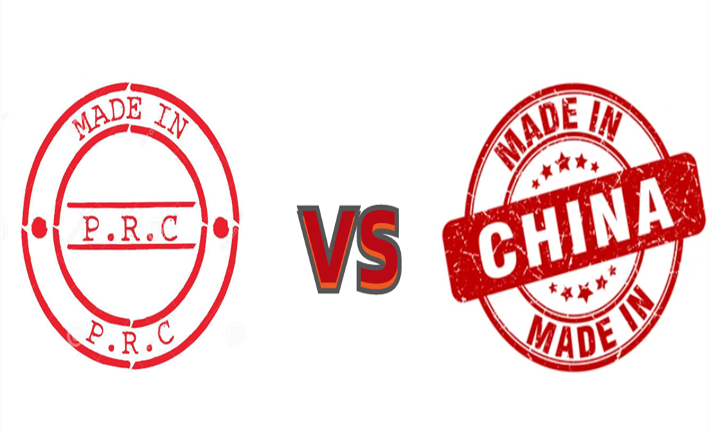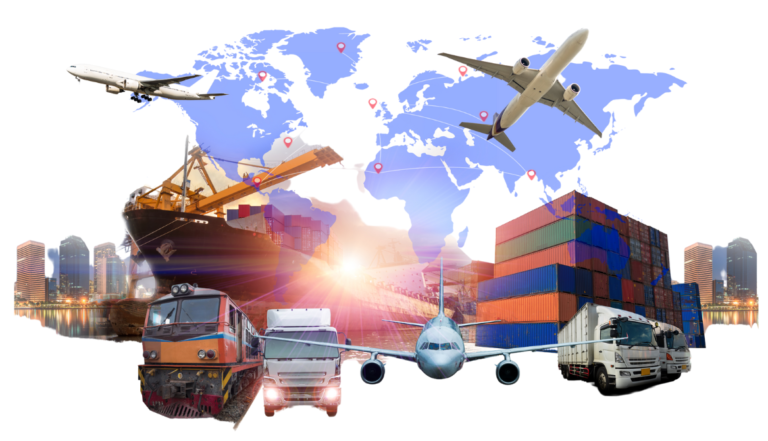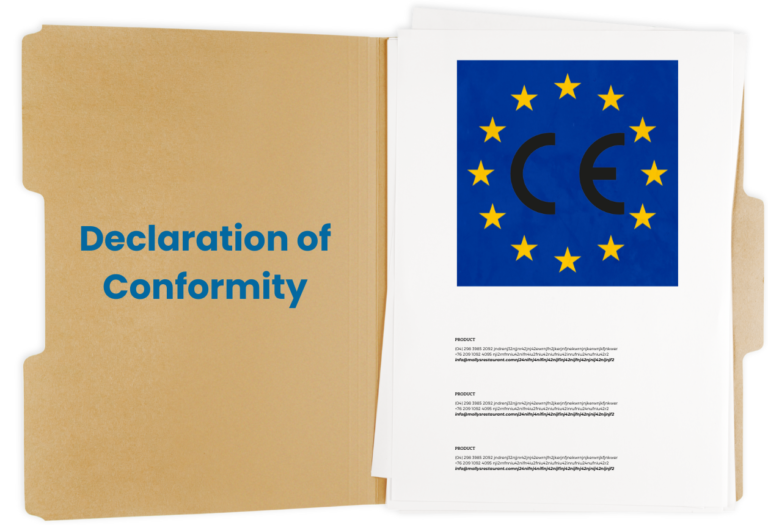When importing from China, you will definitely come across the term “sourcing agent”. Understanding how sourcing agents can help or hinder your sourcing from China process is important to understand your options and risks. This blog post will provide an unfiltered look at sourcing agents – exploring both their benefits and drawbacks.
In this article we discuss:
- What a sourcing agent is and how they are supposed to work
- If a sourcing agent is worth your money or if there are better alternatives
- What kinds of sourcing agents exist, and how to identify one that is a good fit for your needs versus one that could pose problems
- The potential advantages of working with a foreign owned sourcing agent
A sourcing agent in China is a company that can represent you as an importer in China.
We use our knowledge of the Chinese market to locate and assess suppliers, negotiate favourable terms, and ensure quality control. We streamline the sourcing process, reducing risks and optimising the supply chain [1].
Potential benefits for the importer
Using a sourcing agent, importers can benefit from their expertise, market insights, and existing relationships. This saves time and effort and potentially lowers costs.
A China sourcing agent can be a key player for many importers that don’t have local presence. They can help in the process of sourcing China vendors and sourcing products in China. As a middleman between importers and manufacturers, a good sourcing agent finds opportunities, solves problems and handles language, cultural, and logistical barriers. They therefore smoothen the import process.
A good sourcing agent deeply understands the local business landscape, and can find you reliable suppliers. In addition to supplier identification, they may be able to assist with price negotiations, sample evaluation, factory audits, and logistics coordination. Basically, the entire import process to your door.
A sourcing agent plays a crucial role in helping importers with their sourcing needs. They have specific tasks divided into different phases of the purchasing process.
- Finding reliable suppliers
- Preparing orders & Negotiating terms
- Managing orders during production
- Handling quality control and logistics after production
Supplier sourcing
Before you can place any order, you will need to find a reliable supplier. Sourcing agents can help with the selection, evaluation and due diligence for you, including visiting the factory for maximum transparency. They critically evaluate and select suppliers ensuring importers have access to the best options in the market.
Preparing orders & negotiating terms
Sourcing agents ensure the negotiation of terms and that all the necessary details and requirements are clearly communicated and agreed. They negotiate issues like price and MOQ, as well as terms like payment and shipment terms, so that they work best for your business. Often a production contract is made and all details are checked before the order is confirmed. This preparation is essential in China to ensuring a smooth production process.
Management during the production
Good sourcing agents proactively manage your suppliers and your orders. They oversee the production process, address any issues that arise, and keep importers informed about the progress to ensure timely delivery. They stay on top of your orders and may choose to visit the factory for inspections during the production process, to prevent problems early.
Quality control and logistics after production
Sourcing agents may perform quality inspections after the production to ensure the quality delivered. They can also handle the coordination of shipping and logistics, making sure goods are properly transported to the importer’s destination.
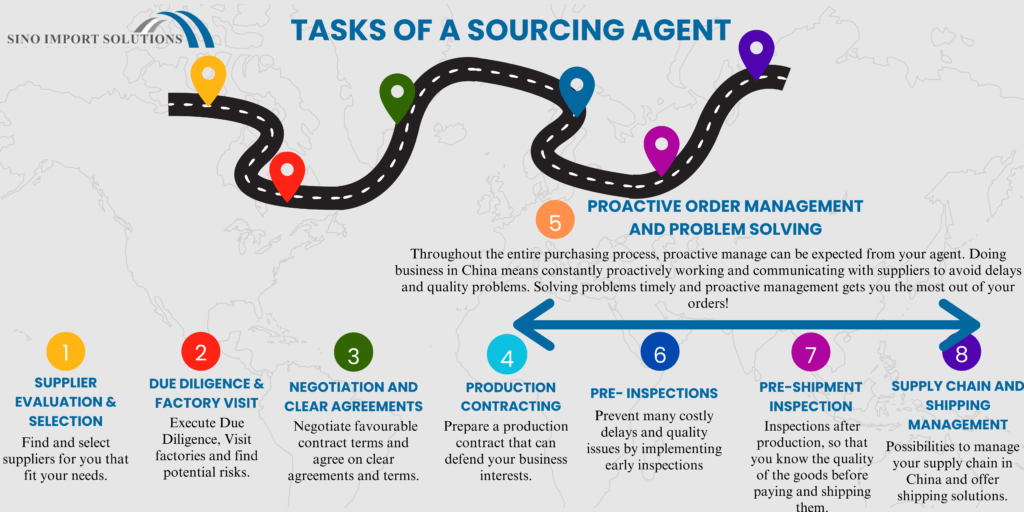
By undertaking these tasks in each phase, sourcing agents support importers to stay in control. They simplify the sourcing process for them and enhance the efficiency and success of their import business. They help you to have your eyes and ears of experts in China without being physically present yourself.
Do you always need an agent to import from China?
Not everyone requires a sourcing agent when importing from China, but there are reasons to consider. Some businesses want to save on costs or prefer self-sourcing if they have existing supplier connections or know the Chinese market well.
Managing suppliers, ensuring product quality, and identifying the opportunities of sourcing in China can be challenging without a physical presence or local knowledge in China.. Due to language and cultural differences and lack of transparency and opportunities to build supplier relationships, you may not be fully in control.
That’s why many importers find great value in collaborating with sourcing agents in China. They make use of their expertise, possibilities to building supplier relationships and their control and management in China. It ensures them a smoother import process and reduces potential risks on delays and costly problems.
Different types of sourcing agents in China
There are different types of sourcing agents in China, each offering unique services and operating models. We discuss:
- Commission-based agents
- Trading-style sourcing agents
- Factory direct sourcing agents
All have pros and cons, so it depends on your needs what type of sourcing agent suits your interests best.
Commission-Based Sourcing Agents
Traditionally, most agents work on basis of commissions. These agents assist with imports based on a commission paid by either the supplier, the customer, or both. They act as intermediaries, connecting importers with suitable suppliers and facilitating the sourcing process.
+ pros:
- Often, these agents can be cheap options when you handle relatively simple products for not too high order amounts. For 3-10% of your order value, they can handle your entire imports.
Working with these kinds of sourcing agents also comes with substantial risks:
– cons
- They may not give you transparency over what supplier they work with. The working model poses a risk for the sourcing agent that the buyer will contact the supplier by himself to avoid paying for the commission. That’s why many agents choose to not reveal their suppliers, making the buyer dependent on the sourcing agent.
- It is very common in China that they receive additional hidden commissions from the suppliers that the buyer pays in the end in the form of a higher factory price.
- Because of the commissions they receive from suppliers, they often serve an own agenda.
Trading-Style Sourcing Agents
These agents work similarly to trading companies. They can do product sourcing in China for you, often in a specific product category and they will find the product and quote you a price. They usually don’t provide transparency regarding the sourcing process, as most buyers are less interested in this, and just want the products they need. Their focus is primarily on facilitating transactions, which makes them a suitable choice for Ecommerce companies dealing with numerous small order amounts.
This kinds of service also comes with pros and cons:
+ pros
- These agents can help you to purchase low product amounts
- They can help you find products from a variety of suppliers in one order
- They save you lots of time by being your one fit supplier
– cons
- You may incur a high margin cost for your products, reaching up to 20%..
- You depend on your agency for your supply chain, not building own supplier network and relationships.
Transparent Factory Direct Sourcing Agents
These sourcing agents prioritize transparency and provide customised sourcing services. They work closely with importers as trusted partners, offering personalised solutions and actively engage and cooperate in the sourcing journey. In this way they can help you to get control over your suppliers and the purchasing process of the goods you want. These kinds of companies charge based on an hourly rate or based on an agreed service package.
These kinds of agents also come with their pros and cons:
+ pros
- These companies can give you transparency and control over your suppliers and the supply chain
- They do not create dependency and should offer flexibility.
- You only pay for the services that bring you value.
- They can help you find market opportunities and help you source customised products
– cons
- This service can get expensive, especially if you have small order amounts and low margins and you don’t clearly agree on service costs in advance.
- It still requires attention and time from the buyer to make the final informed deciscions.
Not all sourcing agents exclusively fall into one of these categories. Various types of sourcing agents in China have distinct advantages and disadvantages, allowing you to choose the most suitable agent for your specific needs.
What can be considered a good sourcing agent in China?
First and foremost, a good sourcing agent provides value tailored to your company’s specific needs. While the definition of value may vary, it’s essential to assess their business model’s compatibility with your requirements. However, several crucial aspects can help evaluate them effectively:
Business support
A good sourcing agent understands and supports your business with its unique business needs throughout the sourcing process. They should have a deep understanding of the market and be able to guide you effectively, ultimately helping your business succeed in importing from China.
Transparency and Trustworthiness
Trust is crucial when working in China, the same goes for working with a sourcing agent. A reliable agent is transparent about their fees, supplier relationships, and any potential conflicts of interest. The more they hide information from you, the more likely it is that the agent has hidden interests, for example in the form of receiving commissions from the supplier. A trustworthy agent will always prioritise your best interests, maintain open communication, and ensure that you have a clear understanding of the sourcing process.
Communication and Professionalism
Effective communication is vital to ensure smooth collaboration between you and the sourcing agent. They should be responsive, prompt in addressing your inquiries, and able to bridge any language or cultural gaps. Many companies often don’t ask the right questions, in order to understand how they can really help you best. Professionalism in the interactions gives you confidence and enables having a productive working relationship.
Skills beyond the surface
A good sourcing agent should possess in-depth knowledge and skills beyond basic supplier identification task. This includes expertise in supplier evaluation, product quality assessment, production process understanding and risk management. They should be able to identify risks, prevent problems and offer strategic and constructive solutions when facing challenges and conflicts. They help you to get the best out of your suppliers and to understand and find the opportunities in the market.
When selecting a sourcing agent, seek alignment with your specific business needs and ensure their understanding of your industry and product category. Prioritize agents with experience catering to businesses similar to yours.
How to Find a China Sourcing Agent: A Step-by-Step Guide
Finding the right agent for sourcing in China can be crucial for a successful import business. In this step-by-step guide, we proved a guide for finding a reliable and suitable sourcing agent that meets your specific needs.
Step 1: Define Your Requirements:
Start by clearly defining your sourcing requirements. Determine the product category, quantity, quality standards, budget, and any specific certifications or compliance requirements. This helps you to understand what type of service you need from your sourcing agent to narrow down the agents that can provide you with those services.
Step 2: Evaluate the Service Type and Expertise:
Once you have a shortlist of potential sourcing agents, assess their expertise and how they bring value. Review their specialisation, industry knowledge, and the services they offer.
Step 3: Assess Communication and Language Skills:
Effective communication is vital in sourcing partnerships. Evaluate the sourcing agent’s communication skills, both in English (or another prefered language) and Chinese. Choose a sourcing agent who demonstrates clear and prompt communication, along with a (cultural) understanding of your market, and asks relevant questions. This ensures smooth collaboration and minimises misunderstandings throughout the process.
Step 4: Verify Credentials:
Ensure the sourcing agent has set up a legally valid company in China that complies with all relevant regulations. Verify their business license and certifications, as it helps protect your business interests and ensures ethical and compliant operations.
Step 5: Conduct Interviews and Due Diligence:
Interview sourcing agents to understand them better. Ask relevant questions about their working ways, processes, capabilities, quality control measures, and how they handle potential challenges. Specifically inquire about their communication methods and business model. Assess their honesty and transparency in these aspects.
Step 6: Request a Trial or Pilot Project:
Consider a small starting project to assess the sourcing agent’s performance. This allows you to evaluate their efficiency, attention to detail, and ability to meet your requirements. It also provides an opportunity to evaluate the compatibility of your working styles.
Step 7: Finalise the Agreement:
Once you have selected a sourcing agent, make clear agreements to enstablish cooperation. Clearly define the scope of work, service fees or commission structure, timelines, and expectations. It’s advisable to have a written contract to protect both parties and ensure a mutual understanding.
Finding the best China sourcing agent in China requires careful evaluation and consideration. By following this step-by-step guide, you can identify a reliable sourcing agent that aligns with your business needs.
Stay in control when a sourcing agent manages your orders
When letting your sourcing agent managing your orders in China, you still want to stay in control. You still need to communicate with your agent to ensure that you get the right product at the expected time for the expected price.
It’s important to request regular updates from your sourcing agent, maintain a record of all communications and documentation related to the order. Follow up promptly at key stages to confirm progress and address any concerns, to prevent these issues leading to delays.
Establish open communication with your sourcing agent, clearly telling them your requirements, expectations, and any specific details related to the order. From your side, provide your sourcing agent with detailed order specifications in writing, including product descriptions, quality standards, packaging requirements, and delivery timelines, to avoid misunderstandings.
By following these points, you can effectively monitor your orders and maintain control when working with a sourcing agent.
Stay in control of the costs of using a China sourcing agent
The costs of a Chinese sourcing agent can vary depending on factors like the scope of services, project and product complexity, and the agent’s experience and skills. Commission based agents typically charge from 3-10% commission on order value, whereby they may receive additional hidden commissions from factories when charging customers a lower percentage.
Factory direct sourcing agents usually charge based on a fixed fee that can be negotiable based on the complexity of the project or an hourly rate of somewhere in the range of $25-$250 per hour. This can vary a lot based on the skills and specialisation of the agent.
To ensure clarity and stay within budget, it’s important to understand the pricing models, additional costs, and payment terms in clear writing from your agent. Discussing these costs openly and negotiating fees upfront helps avoid surprises down the line and builds a strong foundation for a transparent relationship.
Managing the risks of using a sourcing agent
Using a sourcing agent comes with risks that needs your management and control. These risks include potential issues with cost control, ineffective communcation and lack of understanding of your needs and requirements, conflicting interests with the agent and overreliance on the agent.
Below some ways to manage these major risks:
Lack of control over fees, commissions and pricing
Negotiate all costs upfront and get them in writing, including any additional fees in unexpected scenarios. Request periodic cost updates and invoices to ensure transparency throughout the relationship. Also avoid hidden indirect costs by asking transparency by the agent and the supplier when possible. If the agent is unwilling to give you the suppliers’ names, expect that there are additional hidden costs in the product price. Calculate these costs in or work with another agent.
Ineffective communication due to language or cultural barriers.
Thoroughly assess the agent’s language and cultural skills and assess if they really understand your needs and requirement. Often, they might not ask enough or the right questions to understand what you really need. Be very specific and detailed about what you want. Avoid assuming understanding of your needs and requirements, especially by a Chinese agent. Possibly, they got your information wrongly.
Also have a written agreement with your sourcing agent with clear protocols for communication, including setting expectations around responsiveness, to address misunderstandings quickly and ensure requirements are fully understood.
Agent prioritises own interests over client needs.
Agents may prioritise their own interests over clients by reducing their own work or inspections to cut costs or by favouring suppliers that pay commissions. When commissions are paid by suppliers, agents may not keep them to the same standards as they should do when they would only work in your best interests. Also practices such as strong persuasion by giving money to inspectors to be mildly in their judgement are common in China.
To address this, implement checks like establishing minimum inspection standards in contracts and validate agents’ supplier assessments with your own experience. Also review agent performance against contractual obligations. Direct supplier contact to check the quoted prices and keeping oversight can also help to ensure agents prioritise clients’ needs over their own financial incentives.
Overreliance on agent affecting flexibility and control over suppliers
When working with agents, there is a risk of becoming overly reliant on them, which can hinder taking control or switching agents if they deliver inadequate work. Minimize this risk through careful agent selection. Set clear expectations for supply chain management and monitor the agent’s handling of issues to maintain control. Choose an agent who is transparent about the suppliers they work with. If an agent fails to add value, consider switching.
Many buyers rely on sourcing agents and hope they can mitigate China sourcing risks for them, but don’t want to lose control or overrely on them. With good agent selection, clear agreements and strong checks and balances, you can largely mitigate the risks that comes along working with a China product sourcing agent.
The advantages of Western-owned agents located in China
Western-owned sourcing agents based in China can have some key advantages over locally owned Chinese agents. These are a few advantages that you should expect from a Western sourcing company:
- Cultural understanding: As a Western company, they understand the Western business culture and the demands and expectations of its consumers better. This allows them to effectively facilitate communication and ensure requirements from both sides are clearly understood. In addition, as an outsider, you have a more helicopter view of the Chinese business culture from a Western perspective. This allows them to help you understand the world of China sourcing better.
- Objective perspective & Unbiased relationships: A Western-owned company may provide a more independent and objective perspective during supplier evaluations and negotiations compared to a locally owned Chinese agent. This helps ensure the interests of the Western client are prioritised. As an outsider, relationships with local suppliers are built specifically for the client rather than being pre-existing. This minimises potential for bias or conflicts of interest compared to an agent with their own established supply network.
- Compliance expertise: Every country or region has its own compliance regulations relating to quality, safety, etc. An example is the CE regulations for the EU market. Foreign companies with specific knowledge and experience in a certain region will know how to meet the required compliance standards for your market.
Western-owned companies can be more expensive, but they may give you the value and transparency that you need to understand and succeed in the China market.
Conclusion: Is a China sourcing agent worth it?
While using a sourcing agent does come with some risks, a reputable agent with the right business model can greatly streamline and simplify the importing process from China. A good agent should prioritise transparency, build strong supplier relationships, and act as a trusted partner rather than just an intermediary.
For companies without resources in China, the expertise, risk mitigation and cultural understanding an agent provides is often worth the additional costs. Working with the right sourcing partner can help importers to deal with the challenges in China and optimise their supply chain.
What kind of sourcing company are we as Sino Import Solutions?
Sino Import Solutions is a Western (Dutch) owned Direct Factory Sourcing agent in Guangzhou, China that provides full-service support for companies importing from China. In situations, we can also deliver trading service, in which we directly serve as the supplier of goods. We do more than simple sourcing. As your trustable partner, we aim to make the China purchasing process transparent for you.
We do more than simple sourcing. As your trustable partner, we aim to make the China purchasing process transparent for you. We don’t work on commission basis and provide customised services based on a transparent pre-agreed service fee that is affordable for small and medium size companies. We therefore only deliver services that you think bring value to your company, whether that is supplier selection, supplier due diligence, quality control or order and supply chain management. With our boots on the ground and proactive and solution-oriented approach, we can manage your orders, protect your brand’s quality and avoid delivery issues. We work in your interest and get you in control over your suppliers and supply chain in China.
Interested in what we can do for your company? Check out our service overview!

